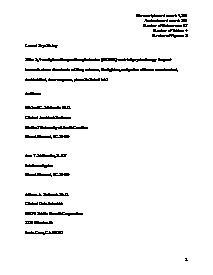3,4-methylenedioxymethamphetamine (MDMA)-assisted psychotherapy for post-traumatic stress disorder in military veterans, firefighters, and police officers : a randomised, double-blind, dose-response, phase 2 clinical trial
Summary
Background
Post-traumatic stress disorder (PTSD) is prevalent in military personnel and first responders, many of whom do not respond to currently available treatments. This study aimed to assess the efficacy and safety of 3,4-methylenedioxymethamphetamine (MDMA)-assisted psychotherapy for treating chronic PTSD in this population.
Methods
We did a randomised, double-blind, dose-response, phase 2 trial at an outpatient psychiatric clinic in the USA. We included service personnel who were 18 years or older, with chronic PTSD duration of 6 months or more, and who had a Clinician-Administered PTSD Scale (CAPS-IV) total score of 50 or greater. Using a web-based randomisation system, we randomly assigned participants (1:1:2) to three different dose groups of MDMA plus psychotherapy: 30 mg (active control), 75 mg, or 125 mg. We masked investigators, independent outcome raters, and participants until after the primary endpoint. MDMA was administered orally in two 8-h sessions with concomitant manualised psychotherapy. The primary outcome was mean change in CAPS-IV total score from baseline to 1 month after the second experimental session. Participants in the 30 mg and 75 mg groups subsequently underwent three 100–125 mg MDMA-assisted psychotherapy sessions in an open-label crossover, and all participants were assessed 12 months after the last MDMA session. Safety was monitored through adverse events, spontaneously reported expected reactions, vital signs, and suicidal ideation and behaviour. This study is registered with ClinicalTrials.gov, number NCT01211405.
Findings
Between Nov 10, 2010, and Jan 29, 2015, 26 veterans and first responders met eligibility criteria and were randomly assigned to receive 30 mg (n=7), 75 mg (n=7), or 125 mg (n=12) of MDMA plus psychotherapy. At the primary endpoint, the 75 mg and 125 mg groups had significantly greater decreases in PTSD symptom severity (mean change CAPS-IV total scores of −58·3 [SD 9·8] and −44·3 [28·7]; p=0·001) than the 30 mg group (−11·4 [12·7]). Compared with the 30 mg group, Cohen's d effect sizes were large: 2·8 (95% CI 1·19–4·39) for the 75 mg group and 1·1 (0·04–2·08) for the 125 mg group. In the open-label crossover with full-dose MDMA (100–125 mg), PTSD symptom severity significantly decreased in the group that had previously received 30 mg (p=0·01), whereas no further significant decreases were observed in the group that previously achieved a large response after 75 mg doses in the blinded segment (p=0·81). PTSD symptoms were significantly reduced at the 12-month follow-up compared with baseline after all groups had full-dose MDMA (mean CAPS-IV total score of 38·8 [SD 28·1] vs 87·1 [16·1]; p<0·0001). 85 adverse events were reported by 20 participants. Of these adverse events, four (5%) were serious: three were deemed unrelated and one possibly related to study drug treatment.
Interpretation
Active doses (75 mg and 125 mg) of MDMA with adjunctive psychotherapy in a controlled setting were effective and well tolerated in reducing PTSD symptoms in veterans and first responders.
Funding
Multidisciplinary Association for Psychedelic Studies.
Geachte bezoeker,
De informatie die u nu opvraagt, kan door psychotraumanet niet aan u worden getoond. Dit kan verschillende redenen hebben,
waarvan (bescherming van het) auteursrecht de meeste voorkomende is. Wanneer het mogelijk is om u door te verwijzen naar de bron
van deze informatie, dan ziet u hier onder een link naar die plek.
Als er geen link staat, kunt u contact opnemen met de bibliotheek,
die u verder op weg kan helpen.
Met vriendelijke groet,
Het psychotraumanet-team.
In: The Lancet, Psychiatry, ISSN 2215-0366 | 5 | 6 | June | 486–497
https://doi.org/10.1016/S2215-0366(18)30135-4


